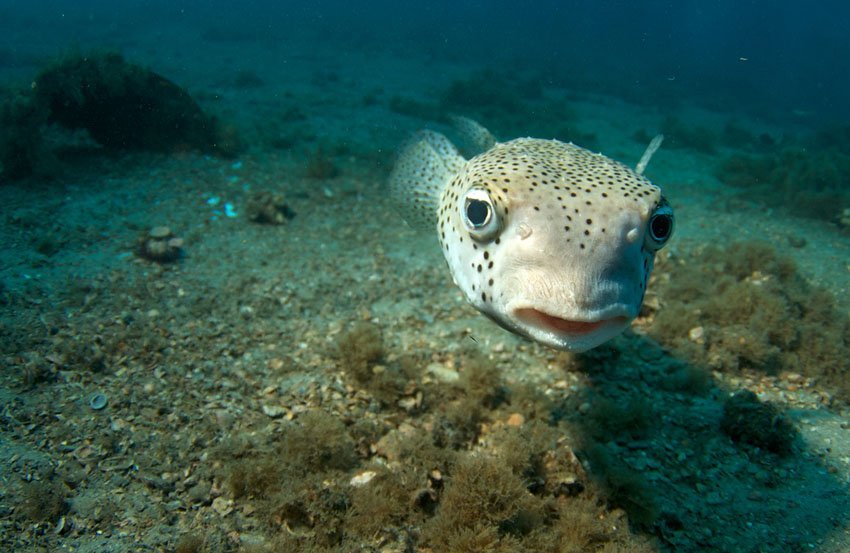Porcupinefishes

Porcupinefishes (Diodontidae) Overview
Porcupinefishes are covered with sharp spines and can inflate into a large ball too big to swallow, which makes it difficult for predators to attack and eat them. When in peace the sharp spines lie flat against their bodies, but stand up when they start to swell.
A large porcupinefish in its inflated state can be the size of a basketball and with its additional 2-3 inch (5-7 cm) spines it can choke a large shark to death.
In addition to their sharp spines as a defense mechanism, porcupinefishes are also poisonous. In spite of this, tiger sharks sometimes prey on porcupinefishes, which really justifies their name as “nature's most feared predator.”
If stung by a porcupinefish, the victim should be brought to a hospital immediately. Their poison tetrodotoxin causes tingling, numbness and eventual paralysis and can lead to death, usually within 24 hours or less. One milligram of tetrodotoxin is enough for humans to cause death. There is no remedy, but artificial respiration can keep the victim alive until the symptoms wear off.
In Hawaii, porcupinefish are also called kokala. In the old Hawaii they were revered by some families as 'aumakua, the family god and protector.
Frequently Asked Questions
How do porcupinefishes defend themselves?
Porcupinefishes can inflate their bodies by swallowing water (or air if out of water), causing their sharp spines to stand up. This makes them appear larger and more dangerous to predators.
Are porcupinefishes poisonous?
Yes, porcupinefishes contain tetrodotoxin, a powerful neurotoxin. It can cause numbness, paralysis, and even death if ingested. There is no antidote, so immediate medical attention is critical.
How big can an inflated porcupinefish get?
When fully inflated, some porcupinefishes can expand to the size of a basketball. With their spines extended, they become nearly impossible for most predators to eat.
Do any animals eat porcupinefishes?
Despite their defenses, tiger sharks have been known to prey on porcupinefishes. These sharks are powerful and adaptable predators capable of taking on unusual prey.
What is the Hawaiian name for porcupinefish?
In Hawaiian, porcupinefishes are called kokala. In traditional Hawaiian culture, they were sometimes revered as 'aumakua - family guardian spirits.








